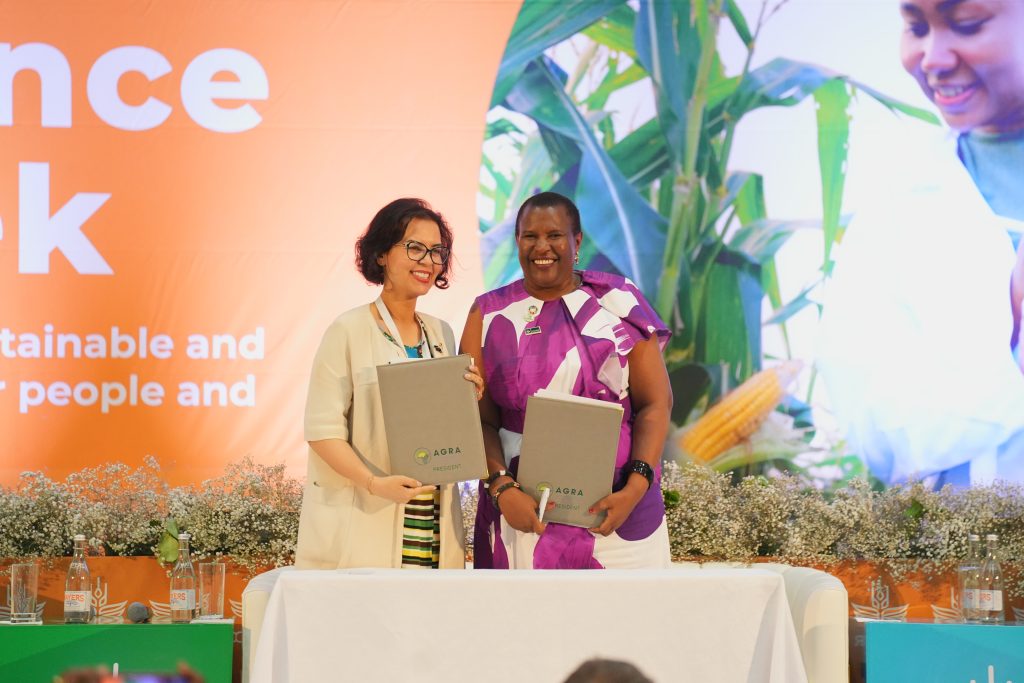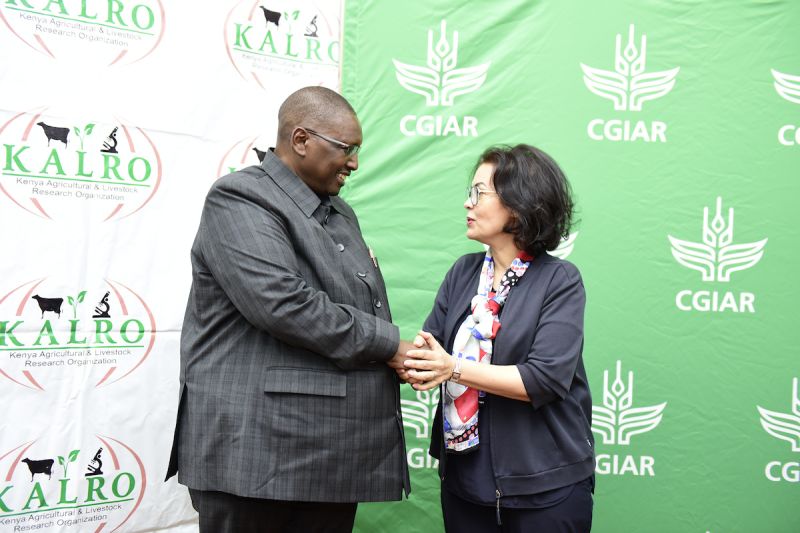
L-R-CGIAR Executive Managing Director Dr Ismahane Elouafi and AGRA President Ms Alice Ruhweza after the MoU Signing Ceremony
AGRA and CGIAR Sign Landmark Partnership Agreement to Scale Agricultural Innovation for Africa’s Smallholder Farmers at Inaugural Science Week
AGRA has concluded a significant week at the inaugural CGIAR Science Week in Nairobi with the signing of a landmark Memorandum of Understanding (MoU) with CGIAR, aimed at accelerating agricultural innovation and delivery across Africa.
The partnership was unveiled during CGIAR Science Week, held from April 7 to 12, 2025, where AGRA played a pivotal role. AGRA President Alice Ruhweza was among the event’s high-level speakers, highlighting AGRA’s commitment to leveraging science and scalable technologies to transform food systems for smallholder farmers.

The newly signed MoU formalizes AGRA and CGIAR’s shared vision of co-developing and scaling science-based innovations for smallholder farmers across Africa.
The agreement builds on a long-standing relationship and establishes a strategic partnership to enhance food systems transformation through joint efforts in research, technology dissemination, and enabling policy environments.
“This moment of CGIAR cementing its collaboration with AGRA is not only a milestone, but also a significant continuation of the legacy we’ve built together in advancing science, innovation, and impact for Africa’s smallholder farmers,” said Ismahane Elouafi, Executive Managing Director of CGIAR.
 “As a vital first step, initiatives such as ‘Capacity Sharing for Development (CapSha)’ establish the framework for a dynamic, multi-directional exchange of knowledge, technologies, and evidence.
“As a vital first step, initiatives such as ‘Capacity Sharing for Development (CapSha)’ establish the framework for a dynamic, multi-directional exchange of knowledge, technologies, and evidence.
This MoU is a strong statement of our resolve to go further together in co-developing solutions and cultivating inclusive, sustainable food system reform across the continent.”
Alice Ruhweza, President of AGRA, emphasized the alignment of the partnership with AGRA’s core mission. “Our collaboration with CGIAR demonstrates our ongoing commitment to accelerating agrifood systems transformation in Africa.
Building on years of collaboration, we now have the potential to work even closer together—scaling ideas, strengthening country systems, and providing smallholder farmers with the tools they need to flourish.This is the first step toward integrating science and delivery.”
The agreement provides a framework for enhanced cooperation across AGRA and CGIAR’s strategic focus areas and geographic priorities, with specific attention to countries such as Burkina Faso, Ghana, Nigeria, Mali, Ethiopia, Uganda, Kenya, Rwanda, Tanzania, Malawi, and Mozambique.
 The MoU outlines collaborative actions that will bridge research and delivery, support enabling policy environments, and promote inclusive, climate-resilient agricultural systems aligned with Africa’s CAADP agenda.
The MoU outlines collaborative actions that will bridge research and delivery, support enabling policy environments, and promote inclusive, climate-resilient agricultural systems aligned with Africa’s CAADP agenda.
A key highlight of AGRA’s participation at the Science Week was its showcase of the Village-Based Advisor (VBA) model, a successful last-mile delivery mechanism that has already reached 28 million smallholder farmers across 12 countries. The model exemplifies AGRA’s approach to embedding advisory support in rural communities and tailoring solutions to agroecological realities and market opportunities.
As part of its commitment to advancing youth-led innovation in agriculture, AGRA brought five dynamic agripreneurs to CGIAR Science Week, to share their perspectives on innovative solutions transforming African agri-food systems.
 These young leaders include innovators like Joyce Rugano, whose AI-enabled Wastebot turns organic waste into fertilizer within 24 hours, and Priscillah Wakarera, whose Agripad device delivers real-time soil data to help smallholder farmers make precise decisions; demonstrating the power of youth-driven technology in building climate-resilient food systems.
These young leaders include innovators like Joyce Rugano, whose AI-enabled Wastebot turns organic waste into fertilizer within 24 hours, and Priscillah Wakarera, whose Agripad device delivers real-time soil data to help smallholder farmers make precise decisions; demonstrating the power of youth-driven technology in building climate-resilient food systems.
As CGIAR Science Week ends, AGRA and CGIAR look ahead with renewed resolve to drive innovation, build resilient food systems, and empower smallholder farmers to be agents of change in the continent’s agricultural transformation.






1 thought on “AGRA,CGIAR Scales Agricultural Innovation for Farmers”